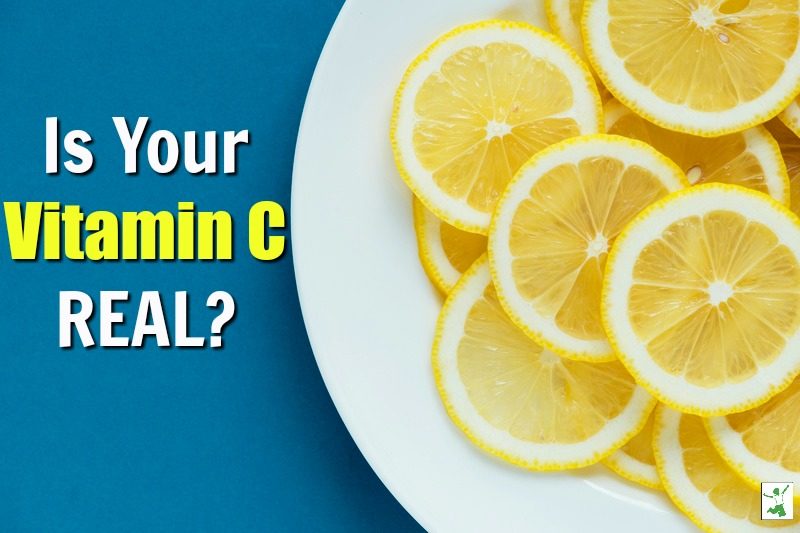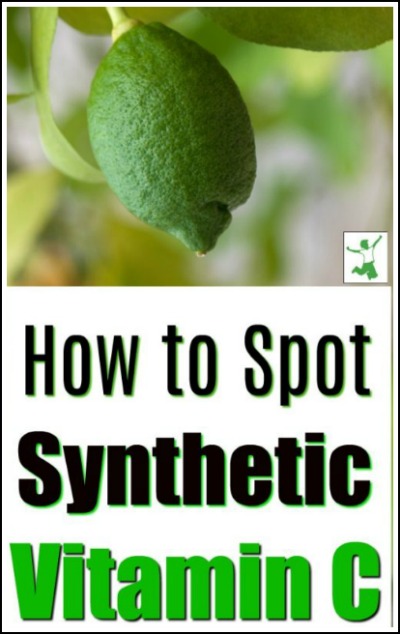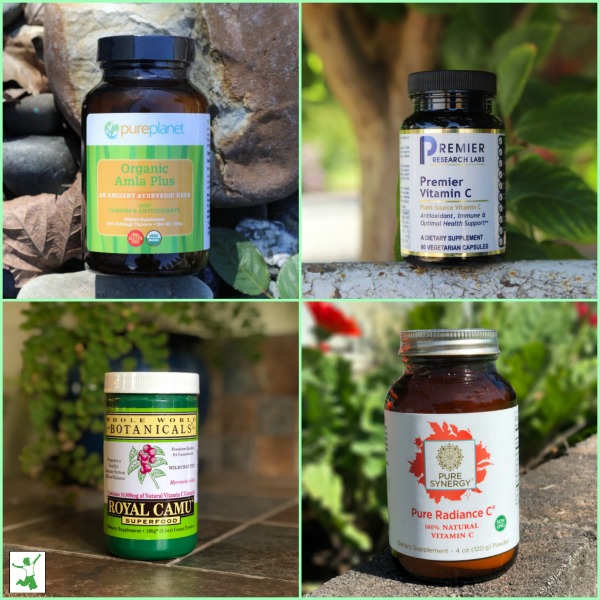Table of Contents[Hide][Show]

Did you know that ascorbic acid is actually synthetic vitamin C? What’s more, it is usually GMO vitamin C, which means it was derived from GMO corn.
If you are learning this for the first time, it can be a rather shocking realization as almost all vitamin C supplements on the market use isolated ascorbic acid separated from a whole food source. The manufacturing process that produces synthetically derived vitamin C leaves all the beneficial co-factors behind!
Even more disturbing, ascorbic acid is frequently marketed as natural vitamin C and added to organic foods as a natural preservative. Truly natural forms of vitamin C and synthetic ascorbic acid seem to be used interchangeably.
How confusing for the consumer!
Nearly all juices and fruit products are loaded up with ascorbic acid, even many organic, healthfood store versions. It seems that if a product is labeled “high in Vitamin C”, consumers buy more of it.
A lot of folks are being fooled by these misleading semantics. There is a growing body of evidence that those consuming high doses of ascorbic acid should have reason to worry.
Three Studies Suggest Caution with High Dose Ascorbic Acid
The journal Wise Traditions cites three studies that give pause about large doses of vitamin C. The first, from the Jun 15, 2001 issue of Science, showed that “synthetic vitamin C may contribute to the formation of genotoxins that can lead to cancer”.
A second study presented to the American Heart Association showed a link between consumption of only 500 mg of vitamin C per day and a greater propensity toward thickening of the arteries (Los Angeles Times, March 3, 2000).
More recently, athletes taking 1000 mg of isolated ascorbic acid per day showed reduced endurance capacity from interference with antioxidant enzymes (American Journal of Clinical Nutrition, Jan 2008).
This information should give pause to anyone who is actively taking synthetic vitamin C supplements such as those Emergen-C packets that are available everywhere, from pharmacies and health food stores to even gas stations!
Supplements like these are NOT boosting immunity and are NOT good for you!
Synthetic vitamins such as ascorbic acid act more like drugs in the body rather than whole food nutrients with all the available co-factors. Taking any synthetic vitamin can cause imbalances in the body and should be avoided.
Another worrisome and popular trend is the recommendation of some alternative health professionals to do a “vitamin C flush” during illness. This therapy (if you can call it that) calls for large doses of ascorbic acid until the onset of diarrhea.
This approach to regaining wellness has never made any sense to me. Now, with more studies indicating the danger of high doses of vitamin C, caution seems well-founded.
Fan of Linus Pauling? Consider This…
If you are a fan of Linus Pauling who popularized the notion of huge doses of Vitamin C for the common cold in the 1970s, consider this. GMO Vitamin C did not exist when Pauling was conducting his studies. GMO derived Vitamin C is what most people are unwittingly taking today!
What’s more, the studies indicating the danger of high doses of vitamin C over long periods of time had not been done yet. They were conducted long after Pauling died in 1994.
What about High Dose, Intravenous Ascorbic Acid?
What about high dose, intravenous ascorbic acid for the very ill? Note that vitamin C for IV use is almost always derived from GMO corn as well as being extremely high dose and synthetic ascorbic acid only.
Under certain circumstances and for the very ill, high dose GMO ascorbic acid therapy can be beneficial. For example, my husband used IV ascorbic acid therapy immediately after each amalgam removal. This prevented any released mercury from getting stored in the tissues. Not doing this risks the development of autoimmune disease.
However, synthetic vitamin C especially when genetically modified shouldn’t be a regular feature in anyone’s diet or supplement regimen.

Whole Food Vitamin C is Naturally Low Dose
The best way to get vitamin C on a daily basis is from whole foods sources. This will provide you this critical nutrient at a low dosage that will do no harm over the long term.
When you get the whole foods version of vitamin C, you don’t need much at all. A truly natural vitamin C supplement with no isolated ascorbic acid is naturally low-dose and yet highly effective.
Don’t forget about the benefits of fresh grassfed milk – a great source of vitamin C. The vitamin C in milk is mostly destroyed by pasteurization, along with many other nutrients. This is why buying fresh and local is so important.
Fresh and lacto-fermented fruits and vegetables (such as traditional sauerkraut) are other excellent sources of the whole vitamin C complex.
Perhaps folks feel the need to take large doses of synthetic vitamin C because all the processed foods they are eating are so devoid of the nutrient in its whole form. Switching to whole foods and dumping those vitamin C supplements in the trash would be a much better approach to boosting immunity!
Ascorbic Acid is Usually from Genetically Modified Corn
What’s worse is that ascorbic acid is not just synthetic. Remember that it is also usually derived from genetically modified corn! More on that GMO vitamin C travesty fooling millions of consumers every single day in the linked article.
Another vitamin scam harming consumers concerns synthetic folate commercially known as folic acid.
The pushing of beta carotene as true vitamin A by food manufacturers and supplement companies is another nutritional falsehood scamming millions of consumers and worse, seriously harming their health.
What to Look for in a True Vitamin C Product
To give you some idea of what to look for in a vitamin C supplement, here are the ingredients of the one I use. Notice that there is no isolated ascorbic acid or other ascorbates and no additives. Just pure food Vitamin C sources. Please note that this is not the only Vitamin C supplement that qualifies as totally pure. There are a few others.
Pure Radiance C ingredients: camu camu berry extract, manioc root, acerola berry extract, amla berry extract, buckwheat sprouts, freeze-dried berry blend, blueberry, raspberry, cranberry, cherry, rose hips fruit, lemon peel, black pepper berry extract.
I also use the Amla C Plus. Here are the ingredients: Organic Amla berry, organic spirulina.
Notice that the words “ascorbic acid” are not listed in either of these products!
Want to know where to find a complete line of whole food Vitamin C supplements from a variety of whole food plant sources?
Click here for several carefully vetted brands to choose from.








Ascorbic acid is SYNTHETIC vitamin c and is harmful to the gut. I got very sick from it. How can you recommend a synthetic, man made vitamin?
Anyone know what this is: Saccharomyces cerevisiae, Lactobacillus, Bulgaricus?
I was told These probiotics are used by the manufacturer to naturally cultivate the nutrients that are used in this product. It’s in this: Raw Vitamin C from the Vitamin Shoppe.
There isn’t actually any difference between ‘synthetic’ vitamin C and ‘natural’ vitamin C.They’re both the same molecule, six carbons, 6 oxygens and 8 hydrogens bound together in the same way. The molecules don’t have any way of knowing how they were derived, and they don’t interact any differently with the body.
The term ‘ascorbic acid’ is just the scientific name for vitamin C. It’s derived from Greek: ‘a’ for anti or absence of, and ‘scorbutus’ for scurvy, because, as I’m sure you know, scurvy occurs due to a lack of vitamin C. So ascorbic acid can be used to refer to ‘synthetic’ or ‘natural’ vitmain C.
Like the author points out, there definitely are problems with consuming too much vitmain C. The only reason that this is a concern when taking ‘synthetic’ vitamin C rather than ‘natural’ vitamin C is that is much easier to overdose when it’s in tablet form. If you had enough oranges, you’d have the same problems, but it’s obviously a lot harder to physically eat that many oranges.
I know it’s a common belief, but the fact that something is natural doesn’t make it safe, and the fact that something is synthetic doesn’t make it unsafe. Malaria, ebola, AIDS, etc. are all natural. Cyanide is present in many fruit seeds, and is found in particularly high concentrations in almonds. On the other hand, paracetamol is man made, but (in the proper dosages) is completely safe.
Excellent explanation.
AIDS is not natural – it was produced in a military lab – milab in USA by two male perpetrators. It was originally introduced in USA in selected urban areas (initially targetting gay communities) as part of the hepatitis-C vaccine. Similarly introduced to Africa as part of smallpox vaccine (and possibly others).
Regarding ebola – Nigerians discovered that the only people who got sick were the ones who presented at the RedCross-run centers and received a jab (ie straight into the blood-stream, thus by-passing several of people’s natural defence mechanisms such as sulliva, skin/sweat barrier etc).
So look back at the previously hyped ‘pandemics’: avian-flue, swine-flue, ebola and the current attempt at kiddology: zika virus – none of them panned-out – people DID NOT rush out to have a ‘jab’ and have their immune system compromised.
The Use of Vitamin C, and other complex Vitamins are necessary because the food is not providing
these products. Therefore, the amount you need will vary with the individual’ diet and the number of years this process has taken place.The replacement needs to be natural, continuous, and cautious.
The added effect of toxins from the food and other sources will make the biochemical pathways difficult. Furthermore, these toxins will have to escape through a good functional Liver. All these factors have to be considered and usually explain some of the different responds.
The other side of the coin:
drlam.com/opinion/vitaminc_and_cancer.asp
I’ve read all the comments and decided to check out all the different types of Vit.C.
Came across this site that explains it fairly well.
lpi.oregonstate.edu/mic/vitamins/vitamin-C/supplemental-forms
I think that alll we need is an open mind and be willing to learn. And a lot of research.
And as someone has already said ‘dont expect to be spoon-fed’
I didn’t see any mention of the compound known as sodium ascorbate as a preferred supplement. Take a look at the video by Suzanne Humphries. She has probably spent more time researching vitamin C than all the bloggers here combined, and quotes results from many a study in her lecture.
https://youtu.be/y0LLX0sgwAU
Thank-you Brian for this link.. Great information for anyone with questions on Vitamin C..
THANK YOU FOR THIS FANTASTIC LINK!
Hi,
As a nutritionist and a researcher, I appreciate you helping point people in the right direction. While your logic may seem right with vitamin C, the science behind it is not. First, how much vitamin C do you think is left post-harvest once the camu camu, acerola cherry or other vitamin C rich foods leave the amazon or other tropical climate, are processed, exposed to varying degrees of temperature, light and moisture, put on an airplane or shipped UPS to a warehouse, then to your door? What you are recommending people buy for vitamin C may in fact be depleted powder, one that I found myself not getting enough vitamin C from. If you disagree, read this study from UC Davis showing what happens to vitamin C post-harvest. http://ucce.ucdavis.edu/files/datastore/234-17.pdf
Also, by cherry picking three studies for vitamin C, you are neglecting literally thousands that show the exact opposite, which is misleading to your readers. For cardiovascular disease, page 100 in Ascorbate: The Science of Vitamin C by Dr. Steve Hickey and Dr. Hilary Roberts document 30 studies showing a positive response to doses over 500mg, and only 1 positive to a dose less than 500mg. They also address the first study you mentioned on page 99 showing that the 2.5 fold increase was not based on an actual reported measurement of the wall, and the change so small that it was “essentially meaningless.” I highly recommend that book and Primal Panacea by Thomas, E. Levy MD, JD to really understand vitamin C and the thousands of postiive studies behind it.
If you really want to get whole food vitamin C, a better recommendation would be to plant persimmons, black currents, berries and citrus and eat them off the vine. But your warning of l-ascorbic acid does not have scientific validity and perpetuates misinformation.
I can guarantee you the thousands of studies you refer to didn’t use GMO derived ascorbic acid!
Well said. If you ask the experts, like Linus Pauling, Hickey, Levy, Klenner they will tell you the cheapest forms of Ascorbic Acid are the best. They’ve been used in countless studies for years, and have saved lives.
And this link to the Oregon State Medical Center (Linus Pauling’s Center) says you’re wrong.
lpi.oregonstate.edu/mic/vitamins/vitamin-C/supplemental-forms
Ummmm, Linus Pauling didn’t live to see GMO corn did he? I would venture to say he would have a different opinion today given that his precious ascorbic acid is adulterated into something else entirely than what he actually used for his research!
It doesn’t matter where the vitamin C (L-ascorbic acid) comes from. Once it’s at the molecular level it is C6H8O8! That is all it is. Synthetic doesn’t come into it.
Citric Acid makes my acid reflux go crazy and also gives me hives and canker sores in my mouth ( on tongue and cheeks). My doctor says I need to take Vitamin C. I can not eat fruits and Vegetables with any Citric Acid in them duo to these side effects. What would you suggest?
I use Vibrant Health brand vitamin C and never have any side effects from it, other than feeling better and having more energy!
I am so relieved to have read your comment ,As I am in the process of healing through vitamin C. After only 2 weeks of dosing via body weight, I mix the powder with water and sip through out the day, To say I feel good is not enough. I can truly say I can not remember the last time I felt so good! Its actually sad that the general public is not made aware of the true benefits of Vitamin C or as I have come to classify it, Ascorbic Acid.
Hi Alex, I realy appreciated your comments on this issue. I am also a nutritionist and researcher. I would love to know your opinion on treating children with Pertussis/ Whooping cough with L-Ascorbic Acid or sodium Ascorbate
Ascorbic acid is an optically active compound. It can have L and D forms. L-ascorbic acid is the natural form and called vitamin-C.
This, when obtained from the natural sources, will be entirely L-ascorbic acid. Hence you can use it safely.
But if it is synthesized in the laboratory, then you may get both L and D forms. So this mixture is to be purified to get only L.
What I have seen in the market is L-ascorbic acid. You have to confirm whether the product in your hand is L or D before purchasing.
Ascorbic acid is the chemical name for vitamin C, which is a powerful antioxidant chemical.
The names “L-ascorbate” and “ascorbic acid” sound so similar that it’s natural to wonder whether they’re the same thing chemically. The answer is both yes and no. Technically, L-ascorbate isn’t identical to ascorbic acid. They’re interchangeable in the body, however, so consuming one amounts to consuming the other, and they both occur in natural sources.